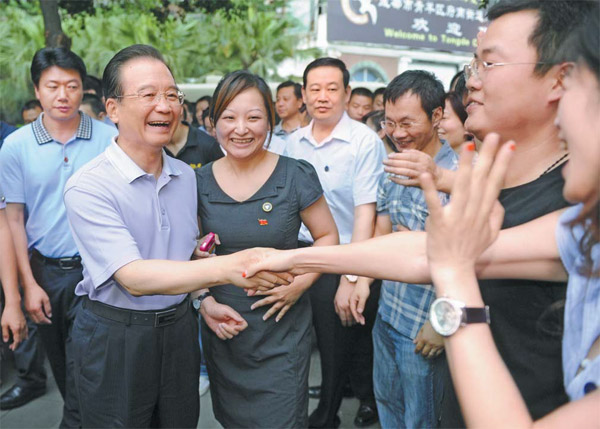
Inspection tours by premier and deputy increase confidence, morale
Inspection tours to pump up economic confidence are being undertaken by top leaders after economic data recorded the slowest growth in three years.
Premier Wen Jiabao and Vice-Premier Li Keqiang both highlighted the need to "strengthen confidence" in stabilizing growth, although they warned against risks ahead during their inspection tours over the weekend.
Wen warned on Sunday that "hardship" may continue.
|
 Premier Wen Jiabao chats with residents in Chengdu, Sichuan province, on Friday. Wen focused on the need to maintain and boost economic growth during a three-day inspection tour of the province. WANG XIWEI / FOR CHINA DAILY |
The premier underlined the "complexity and severity" of the economic situation as well as challenges caused by downward pressure.
Wen called for greater efforts to strengthen the "vitality and dynamism" of the economy, including more support for logistics and the private sector, during an inspection tour of Southwest China's Sichuan province from Friday to Sunday.
His comments came after data released on Friday showed Asia's largest economy reported 7.6 percent growth in the second quarter. While these would be remarkable figures in almost any other country, they did mark the sixth consecutive quarter of decline and the slowest growth pace since the first quarter of 2009.
The GDP growth target for 2012 has been lowered to 7.5 percent from 8 percent in the face of a persistent slump in the United States and spreading debt woes in the European Union.
The premier, however, stressed that efforts to stabilize the economy are working as it was running at a slower, and more stable, pace of growth.
"The growth rate is still within the government's target range set early this year, and stabilization policies are working," Wen said.
Wen said China's economic fundamentals remained sound and the country retained huge growth potential. He cited a bumper summer harvest, easing inflation and rising incomes as evidence.
A recovery in home sales, a jump in investment, lower interest rates and reserve requirements for banks are boosting the economy.
In the second half of the year, the government will "increase efforts to preset and fine-tune its policies, and make them more targeted and effective," he pledged.
The government will also combine stabilizing investment with implementing medium to long-term development plans. It will also promote urbanization and agricultural modernization, improve the standard of living, upgrade industries and encourage private investment, Wen said.
More must be done to deepen income distribution reform, raise incomes, improve social networks and create more jobs, especially for graduates, he added.
Addressing local enterprises, Wen highlighted the importance of the logistics sector, as smooth distribution can boost consumption and production.
"Logistic companies can grow bigger and stronger via mergers and information technology upgrades," he said.
Meanwhile, the premier stressed the rapid growth, strong adaptability and great potential of private enterprise.
"We should assign some of the country's major scientific and technological projects to private companies," he said.
Also during an inspection tour over the weekend, Vice-Premier Li Keqiang said that domestic demand and balanced growth were the way forward for the economy.
"China should stick to the general principle of seeking growth while maintaining stability and strive to expand domestic consumption in order to stabilize economic growth,'' Li said in Central China's Hubei province.
He said China should expand consumption and restructure the economy by structural tax cuts, stimulate consumption and encourage and guide private investment.
The country should also nurture emerging industries and transform outdated production methods to those of better quality, Li said.
To buoy the economy, China has adopted a string of pro-growth measures, including lowering the reserve requirements of banks to boost lending, subsidizing energy-saving household appliances and speeding up approval for major construction projects.
In its latest move, the central bank cut the benchmark interest rate for the second time in a month to inject liquidity into the market.
However, economists are calling for measures other than financial and fiscal incentives to restore growth.
"When the economy is slowing down, company demand for money also declines,'' said Xu Xiaonian, an economist and finance professor at the China Europe International Business School.
"Loosening monetary policy now is like watering the plant when it's raining.
"The right medicine is to create new investment opportunities, break monopolies, relax government control, protect intellectual property and boost private investment," Xu wrote on his micro blog.
Fan Jianping, chief economist at the State Information Center, said cutting tax is the best way to boost consumption.
"The key to expanding consumption is tax reduction and distribution reform," he said.
Apart from cutting income tax, Fan called for further reform of value-added tax to lower the prices of consumer goods, and end the phenomenon of "Made in China" goods sold even cheaper abroad than in the domestic market because of export tax rebates.
Meanwhile, Fan said, any new incentives should not bring about further inflation or appreciation in housing prices.
Tang Jianwei, an analyst with the Bank of Communications, said China's economy is at a crossroads.
"To improve productivity requires higher efficiency and technical upgrades," he said.
"Therefore, in the long term, the key to open a new era for sustained growth is to widen the access for private capital to stimulate private investment."
Xinhua contributed to this story.
weitian@chinadaily.com.cn







